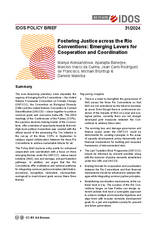Policy Brief
Fostering justice across the Rio Conventions: emerging levers for cooperation and coordination
Aleksandrova, Mariya / Aparajita Banerjee / Marcelo Inacio da Cunha / Jean Carlo Rodríguez de Francisco / Michael Brüntrup / Daniele MalerbaPolicy Brief (31/2024)
Bonn: German Institute of Development and Sustainability (IDOS)
DOI: https://doi.org/10.23661/ipb31.2024
The ever-deepening planetary crisis stipulates the urgency of bringing the Rio Conventions – the United Nations Framework Convention on Climate Change (UNFCCC), the Convention on Biological Diversity (CBD) and the United Nations Convention to Combat Desertification (UNCCD) – closer together to achieve common goals and overcome trade-offs. The 2024 meetings of the Conferences of the Parties (COPs), the supreme decision-making bodies of the Conven-tions, offer a window of opportunity towards that end. High-level political momentum was created with the official launch of the pioneering Rio Trio Initiative in the run-up of the three COPs in September to catalyse urgent collaboration between the three Rio Conventions to achieve sustainable futures for all.
This Policy Brief explores entry points for enhanced cooperation and coordination with a focus on three emerging themes under the UNFCCC: nature-based solutions (NbS), loss and damage, and just transition pathways. In addition, we argue that the Rio Conventions offer multilateral and national platforms for integrating common justice principles (distributive, procedural, recognition, restorative, cosmopolitan, ecological) to meet shared goals across these three themes.
Key policy insights:
• There is a need to strengthen the governance of NbS across the three Rio Conventions so that NbS are not considered as the ticket to business as usual. Even though there is controversial evi-dence of the impacts of NbS on social and eco-logical justice, currently there are not enough developed joint measures between the Con-ventions to address these risks.
• The evolving loss and damage governance and finance space under the UNFCCC could be instrumental for creating synergies in the areas of capacity development, policy instruments and financial mechanisms for building just response frameworks of interconnected risks.
• The Just Transition Work Programme (UNFCCC) should be informed by relevant priorities along with the inclusion of justice elements established under the CBD and UNCCD.
• Existing formats for cooperation and coordination between the Rio Conventions and their financial mechanisms should be enhanced to catalyse link-ages while integrating common justice principles.
• Establishing coordination mechanisms at the na-tional level is key. The success of the Rio Con-ventions hinges on how Parties can design co-herent policies that have a synergistic approach to achieve multiple environmental objectives and align them with broader domestic development goals for a just and equitable society for present and future generations.
Contact
Cornelia Hornschild
Publication Coordinator
E-mail Cornelia.Hornschild@idos-research.de
Phone +49 (0)228 94927-135
Fax +49 (0)228 94927-130
Alexandra Fante
Librarian/ Open Access Coordinator
E-Mail Alexandra.Fante@idos-research.de
Telefon +49 (0)228 94927-321
Fax +49 (0)228 94927-130








![[Translate to English:] Photo: Alexandra Fante, Bibliothekarin/Open Access-Koordinatorin](/fileadmin/_processed_/f/0/csm__c_Deutsches-Institut-fuer-Entwicklungspolitik_Fante_94ce4fa1ba.jpg)